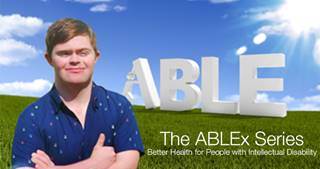ABLEx Series

Our FREE, SELF-PACED ABLEx Series aims to improve the health of people with intellectual disability around the world. It can be accessed here: https://www.edx.org/xseries/intellectual-disability-healthcare. More than 120 contributors from 22 countries have provided content. The courses are self-paced and free. The courses are tiered to fit with Years 1, 2, 3 of any health, medical, or related degree. They can also be used for workforce education. Anyone can do the courses – they are open to everyone!
To access the courses for free:
- enrol in each course seperately
- select to 'audit' the course
ABLE101x – Through my Eyes
Focuses on the stories of people with intellectual disability around the world, and their families and supporters. Over four parts, students will look at the barriers and enablers to healthcare for people with intellectual disability, their experience of specific syndromes and communication difficulties, and how they stay healthy. Students will listen to family members speaking about complex care, rare syndromes, early death, and planning for independence. The final component focuses on the history of treatment, the impact of rights’ movements on healthcare delivery, common health conditions, and health promotion. https://www.edx.org/course/through-eyes-intellectual-disability-uqx-able101x
ABLE201x – Well and Able
Examines the specific physical health issues that affect people with an intellectual disability including, oral health, syndrome specific health issues, health communication, especially for non-verbal patients, sexual health, and interactions between tertiary and primary healthcare systems. There is a special section on complex care including issues associated with aging and spasticity, and the health impacts of epilepsy. https://www.edx.org/course/well-able-improving-physical-health-uqx-able201x
ABLE301x – Able-Minded
Focuses on the mental health issues of people with intellectual disability. Students learn about the complexities of diagnosing mental health issues in people with intellectual disabilities and the types of disorders, assessments, screenings, and treatments used. There is a special focus on the legal and ethical complexities in health practice with patients who often require substituted consent. https://www.edx.org/course/able-minded-mental-health-people-uqx-able301x
